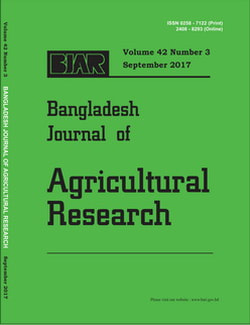 EFFECT OF COMPOST TEA, STREPTOMYCIN AND CUPRAVIT IN CONTROLLING BACTERIAL LEAF BLIGHT OF RICE Bangladesh Journal of Agricultural Research September 2017 Link Here Rice is the biggest food crop in Bangledesh, a small country bordering northeast India. A common disease of rice is Bacterial Leaf Blight, caused by the bacteria Xanthomonas oryzae pv. oryzae. One of the common treatments for the disease is Cupravit, a synthetic fungicide that is toxic to people, and other mammals like mice and other rodents. Considering mice are food sources for predatory birds and reptiles, applying a synthetic fungicide is detrimental to organisms higher on the food chain. A group of scientists from the Bangladesh Agriculture University want to help, and they want to do it using compost tea. An experiment was set up that compared the effectiveness of Compost Tea, Cupravit, and the common antibiotic Streptomycin. Diseased rice plots were given one of the three treatments, and one plot was left as a control group to be compared against. After 14 days of growth, the presence and severity was of the Bacterial Leaf Blight was assessed. The researchers found that the compost tea was nearly effective as the Cupravit as compared to the control, enough so that the researchers concluded that "The compost tea was highly effective to control bacterial leaf blight (BLB) in rice which could replace the chemical fungicides without any risk to human, animal and environment." By switching from synthetic pesticides to natural and safe ones, we can change our landscape back to one of vigor for lifeforms big and small.
0 Comments
Your comment will be posted after it is approved.
Leave a Reply. |
Archives
June 2024
Categories
All
|
Contact Us
Why TeaLAB?TeaLAB is committed to helping people and their gardens to become more self- sufficient, healthier, and productive. Grow your sweetest corn, your biggest watermelon, your tallest quinoa, your tastiest tomato, and your happiest you.
TeaLAB was founded to teach people how to garden organically, so that we can become more closely connected with the land. Our goal has been to simplify growing methods so that gardeners have a positive experience in the garden. TeaLAB is where the garden meets the laboratory. From around the world and into your backyard, our products contain ingredients that are sourced both locally and globally. Using methods both ancient and cutting edge, TeaLAB promotes maximum biology. Grow with TeaLAB. |

 RSS Feed
RSS Feed
